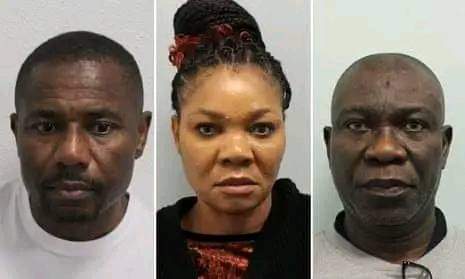Senator Ike Ekweremadu, his wife, Beatrice and a medical “middleman” have been jailed for conspiring to traffic a market trader to the UK to harvest his kidney.
Ekweremadu, 60, his wife Beatrice, 56, and 25-year-old daughter Sonia stood trial accused of a conspiracy to bring the man to Britain from Lagos for his organ.
The couple, along with medical “middleman” Dr Obinna Obeta, 50, were found guilty in the Old Bailey in March.
Their daughter, Sonia Ekweremadu – who has a serious kidney condition – wept as she was cleared of the same charge.
According to reports from a sentencing hearing today, Ekweremadu was jailed for nine years and eight months, his wife Beatrice was sentenced to four years and six months in prison, while Obeta received a 10-year prison term.
Mr Justice Johnson told the defendants: “In each of your cases the offence you committed is so serious that neither a fine nor a community sentence can be justified.”
It was alleged the 21-year-old street trader was to be rewarded for donating the organ to Sonia Ekweremadu, in an £80,000 private procedure at London’s Royal Free Hospital.
The case marked the first time defendants have been convicted under the Modern Slavery Act of an organ harvesting conspiracy.
While it is lawful to donate a kidney, it becomes criminal if money or another material advantage is rewarded.
The prosecution claimed the donor was offered up to £7,000 along with the promise of a better life in the UK.
The donor did not understand until his first appointment with a consultant at the hospital that he was there for a kidney transplant, the Old Bailey was told.
According to the consultant, he had a “limited understanding” of why he was there and was “visibly relieved” at being told the operation would not go ahead.
It was claimed the man was falsely presented as Sonia Ekweremadu’s cousin in a failed attempt to persuade medics to carry out the procedure at the Royal Free Hospital.
The donor cannot be identified for legal reasons.
Defendants ‘intended harm’ to donor
On the question of harm to the victim, the judge said: “The transplant did not go ahead but each intended that it should go ahead and you each intended the harm to the donor that would result.
“He would have faced spending the rest of his life with only one kidney and without the requisite funding for the required aftercare.”
He added that the risks had not been properly explained to the victim and there had been no consent “in any meaningful sense”.
Starmer says Labour ‘on path to majority’ after gaining key authorities in early results
0





